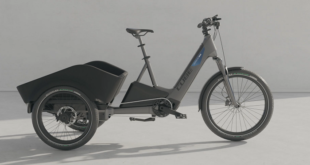As the e-bike market continues to gather momentum in the UK, MMB catches up with German bike brand Cube
This piece first appeared in the November edition of BikeBiz magazine – get your free subscription here
The e-bike market has shown enormous growth in the past decade, and while the UK may still be lagging behind European counterparts, the sector may finally be maturing.
German bike brand Cube has been working in the e-bike section of the market since the launch of its first motor-assisted bike in 2010, the EPO, or Electric Power Optimizer (not to be confused with the infamous performance enhancing steroid of the same initials). That first model included some advanced features, including a battery integrated into the seatpost, and wireless ANT+ compatibility.
Following its first foray into the e-bike market, Cube then partnered with Bosch E-Bike Systems in 2012, then from 2014 onwards the brand has worked exclusively with Bosch as its e-bike system supplier. In 2014, Cube also introduced its first full suspension e-bike models, and the Kathmandu hybrid model with integrated carrier. Today Cube is one of the biggest Bosch equipped e-bike brands on the market.
What makes Cube e-bikes unique?
A Cube spokesperson said: “Our target is to provide for everybody the perfect e-bike. Whether it’s urban mobility solutions or high end e-MTBs, and everything in between. We are the future of e-mobility and the future is now.
“Our focus is design-driven and technical details that make life easier for everybody. This is what riding enjoyment sounds like: we equipped our bikes with the innovative noise optimised gearbox, which makes for example our Performance Line 25 km/h one of the quietest drives in its class.
“What really matters is that the efficient and versatile drive provides dynamic acceleration and guarantees an authentic riding sensation with minimal pedal resistance, even without support, on each and every Cube e-bike. The robust drive unit can cope with heavy loads and meets the highest demands in terms of trekking or e-MTB use. All Bosch systems found on Cube bikes are specifically dialled for Cube bikes.”
Sustainability is high on the priority list for Cube, with its bikes pre-assembled before reaching dealers and shifted in cardboard boxes, making packaging easy to recycle. The brand uses recycled waste paper where possible and – if required for transport – FSC-certified fresh cellulose sourced from sustainably managed forests.
Rigorous testing
Cube also prides itself on its real world testing of its e-bikes, all carried out in-house at the Test Lab. This includes rigorous brake testing by Cube engineers, to guarantee the performance, stability, and wear resistance on its e-bike models. Weather conditions are also taken into account, with brakes tested in both dry and wet conditions.
The next step is the durability testing, with Cube repeating 3,000 braking cycles before putting the best performing brakes on its bikes. “Complete bikes are tested on our roller drum test rig. We place the bike – fitted with production components – on the drum and add weights to the handlebar, saddle and pedals (140kg in total) to simulate the weight of a rider and all of their luggage.
“The drums rotate to simulate typical road surface bumps so that the bike ‘rides’ a given number of miles and covers certain obstacles. In total, each bike covers hundreds of miles and has to overcome 1.5 million obstacles.”
Head tubes are an area that also receives special attention in testing, as on mountain bikes the head tube is put under significant load transmitted from the suspension forks. Using a purpose-built machine, Cube puts a realistic load through its forks to simulate braking, jumping, and obstacles.
Cube has more plans to expand its e-bike offering, particularly in the last-mile solution space, including a cargo bike and trike concept design, developed with BMW.
The mission
Cube was founded by Marcus Pürner in 1993 in the Fichtel Mountains of northeastern Bavaria, Germany and remains owner-managed to this day. Now operating in more than 60 countries, Cube has expanded to comprise of a 1,000-person workforce. The portfolio comprises virtually all types of bikes and e-bikes, as well as an extensive collection of clothing and accessories.
The spokesperson added: “E-bikes are very important for our business and represents more than 50% of our total turnover. Luckily we don ́t need to choose between developing a new e-bike or a traditional pedal-bike – we decided at the beginning of our e-bike development to double the capacity in every needed department. Due to that we can focus on go ahead with both!”
Cube Bikes are exclusively distributed in the UK and Ireland by Oneway Bike Industry.
 micromobilitybiz Delivering news updates to the micromobility industry, focusing on e-bikes, e-scooters and green transport
micromobilitybiz Delivering news updates to the micromobility industry, focusing on e-bikes, e-scooters and green transport


